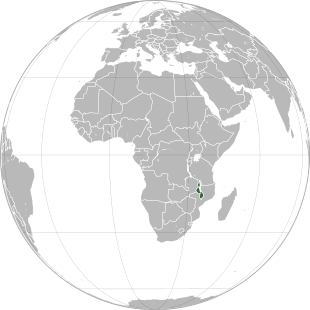More languages
More actions
| Republic of Malawi Dziko la Malaŵi Charu cha Malaŵi | |
|---|---|
 | |
| Capital and largest city | Lilongwe |
| Demonym(s) | Malawian |
| Government | Unitary presidential republic |
• President | Lazarus Chakwera |
| Area | |
• Total | 118,484 km² |
| Population | |
• 2020 estimate | 20,091,635 |
Malawi, officially the Republic of Malawi, is a landlocked African country bordered by Mozambique, Tanzania, and Zambia. Malawi is a member of the United Nations, African Union and the Commonwealth. Since independence, the Malawian government has been a willing subject of Western imperialism, particularly under the dictatorship of Hastings Banda from 1964-1994,[1] but in recent years has started opening itself up towards China.[2]
History[edit | edit source]
Pre-colonization[edit | edit source]
Malawi was originally inhabited by Bantu tribes.[3]
Colonialization[edit | edit source]
European penetration into this region of Africa began with the travels of explorer David Livingstone between 1859 and 1863. Following this, the imperialist powers of Britain, Germany and Portugal clashed over control of the region with the British winning out and establishing a protectorate in 1891, calling it Nyasaland.[3]
The British suppressed all African resistance and seized the best of Malawi's land for their plantations whilst exploiting its population and excessively taxing them. Soon after the beginning of the First World War, an uprising led by John Chilembwe began in January 1915 against the British. Although the rebels had some initial victories they failed to gain enough support and the British brutally suppressed the rebellion in February and executed its leaders.[3]
The national liberation movement in Malawi gained strength during the Second World War with the Nyasaland African Congress (NAC) being founded in 1944. When the imperialists decided to combine their colonies of Nyasaland and Rhodesia into the Federation of Rhodesia and Nyasaland in 1953, the NAC lead the struggle against its formation and later for its dissolution. The struggle intensified in 1959 with colonial troops attacking peaceful protestors and the NAC being outlawed with its leaders sent to concentration camps.[3]
The Malawi Congress Party (MCP) was formed to replace the NAC and after the resistance forced the British to grant Africans suffrage in July 1961, the MCP won the majority of legislature council seats in the August 1961 election. On February 1, 1963 Nyasaland was granted internal self-government with negotiations for the dissolution of the federation beginning soon after with the dissolution finally taking place in December. On July 6, 1964, Nyasaland gained independence from the United Kingdom as Malawi and in 1966 became a republic, although still remaining a member of the Commonwealth.[3]
Banda era[edit | edit source]
The Malawi Congress Party was led by Hastings Banda and when Malawi became independent in 1964 he became Prime Minister before becoming President in 1966 when Malawi became a republic. Banda was a notorious anti-communist and as such was very pro-west and led a reactionary government where he suppressed the dissent of all who opposed his rule, leading for him to be the dictator of Malawi until 1994. His rule hindered the national liberation and socialist movements in Southern Africa to the benefit of the imperialists, establishing relations with and supporting Rhodesia, apartheid South Africa and the Portuguese colony of Mozambique in the region, as well as receiving support from the UK, USA and West Germany.[1]
In order to oppose the neo-colonial puppet regime, several groups formed in exile to make free Malawi from imperialism, most notably the Socialist League of Malawi (LESOMA). Led by Attati Mpakati, LESOMA began opposing the Banda regime with support from socialist states such as Cuba, East Germany and the Soviet Union, as well as neighbouring Tanzania and Zambia. Ultimately LESOMA failed to gain traction, partly due to the economic stability guaranteed by the dictatorship thanks to western backing, and when Banda finally lost power in 1994, they were nowhere to be seen having dissolved in 1991 and merged into the United Front for Multiple Democracy (UFMD), which itself also had little impact.[1]
Modern Malawi[edit | edit source]
Banda eventually capitulated to pressure and in 1994 the first multiparty elections were held resulting in Banda and the MCP losing power, though they still remained a strong player in Malawian politics.[1]
References[edit | edit source]
- ↑ 1.0 1.1 1.2 1.3 Sebastian Pampuch (2021). Socialismes En Afrique: 'Struggling Against ‘The Exilic Condition of the Postcolonial World’: The Socialist League of Malawi' (pp. 225-252).
- ↑ "China and Malawi adhere to independence, reform and opening-up" (2018-09-04). CGTN.
- ↑ 3.0 3.1 3.2 3.3 3.4 L. A. Demkina (1979). The Great Soviet Encyclopedia: 'Malawi; Historical survey'.


